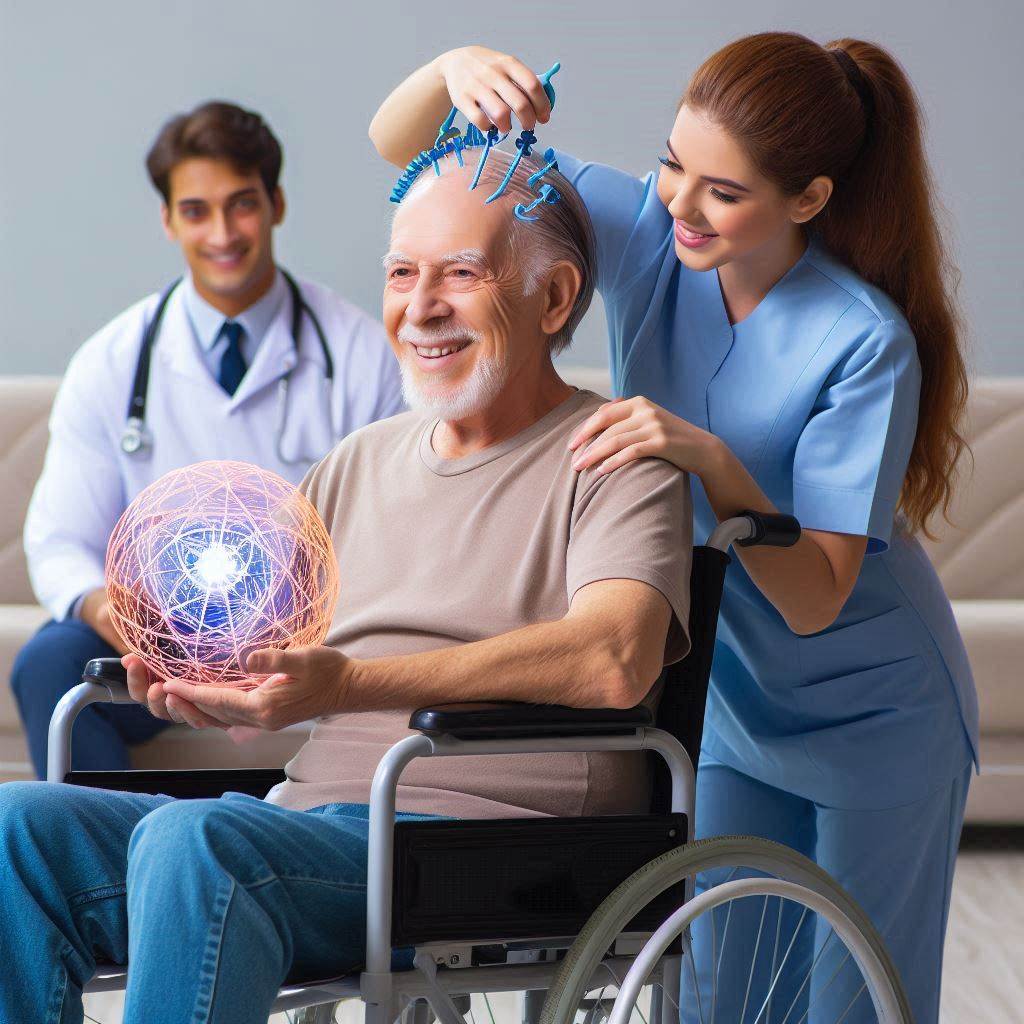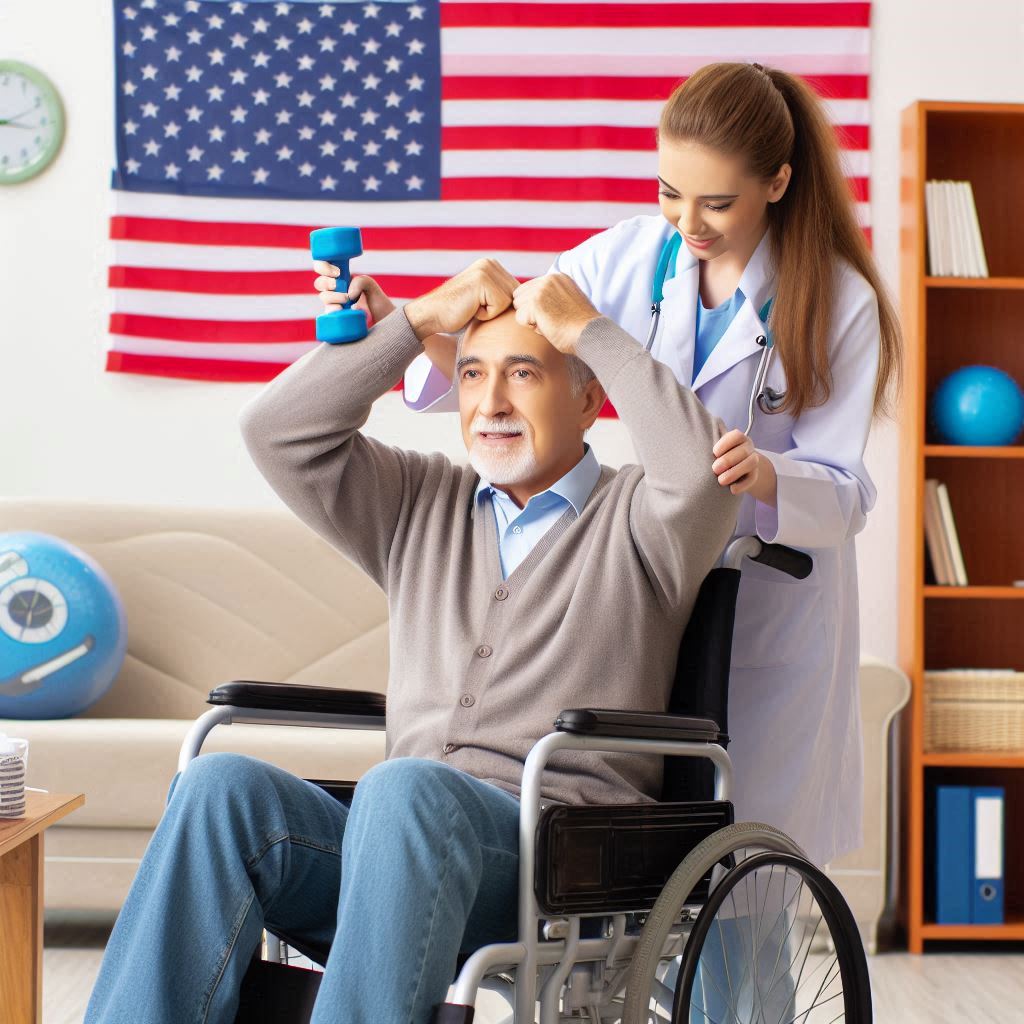Introduction
Recreational therapy for physical disabilities encompasses structured activities to enhance health. These activities are tailored to individual needs, promoting engagement and wellness.
Recreational therapy, or therapeutic recreation, uses activities like sports, arts, and games for rehabilitation. It targets physical, emotional, and social well-being through enjoyable experiences.
Importance of Recreational Therapy
Recreational therapy plays a pivotal role in enhancing physical abilities. Activities such as adaptive sports and aquatic exercises improve strength and mobility.
Beyond physical improvements, recreational therapy uplifts mental health. It reduces stress, anxiety, and depression, fostering a positive outlook on life.
Participation in group activities fosters social skills and community integration. It encourages friendships and support networks among individuals facing similar challenges.
Each therapy session is tailored to the individual’s abilities and goals. Therapists adapt activities to ensure inclusivity and maximize therapeutic benefits.
By addressing physical and mental aspects simultaneously, recreational therapy promotes holistic well-being. This approach enhances overall quality of life for participants.
Accessibility and Inclusivity
Therapeutic activities are designed to accommodate various disabilities. Accessible facilities and adaptive equipment ensure inclusivity for all participants.
Therapeutic Outcomes
Studies show that regular participation in recreational therapy improves motor skills and functional abilities. It also enhances self-esteem and independence.
Case Studies and Success Stories
Numerous individuals have experienced significant improvements in their health and daily lives through recreational therapy. Success stories highlight the transformative impact of these interventions.
In general, recreational therapy is not merely leisure; it is a vital component of rehabilitation for individuals with physical disabilities. Its holistic approach addresses both physical and mental well-being, promoting independence and a fulfilling life.
Types of Recreational Therapy Activities for Physical Disabilities
Recreational therapy offers diverse activities tailored to enhance physical abilities and enrich the lives of individuals with disabilities.
These activities span adaptive sports, aquatic therapy, and art therapy, each offering unique benefits and opportunities for growth.
Adaptive Sports
Adaptive sports modify traditional sports to accommodate disabilities, promoting physical fitness and social engagement. Wheelchair basketball, for instance, fosters teamwork and cardiovascular endurance while improving upper body strength.
Participants learn resilience and teamwork, crucial for both physical and emotional well-being.
Benefits of Adaptive Sports
- Physical Fitness: Enhances cardiovascular health and muscle strength.
- Social Integration: Fosters camaraderie and teamwork skills.
- Mental Well-being: Boosts confidence and resilience through competitive play.
Adaptive sports empower individuals by emphasizing abilities over disabilities, promoting a sense of achievement and community inclusion.
Aquatic Therapy
Aquatic therapy utilizes water’s buoyancy to reduce strain on joints and muscles, making it ideal for improving mobility and strength without excessive impact.
Activities range from simple exercises to structured movements, tailored to individual needs. Swimming and water aerobics enhance flexibility and balance while alleviating pain associated with physical limitations.
Benefits of Aquatic Therapy
- Low-Impact Exercise: Reduces strain on joints and muscles.
- Improved Mobility: Enhances range of motion and flexibility.
- Pain Management: Alleviates discomfort through gentle resistance and buoyancy.
Water’s therapeutic properties promote relaxation and confidence, offering a holistic approach to physical rehabilitation.
Art Therapy
Art therapy integrates creative expression with therapeutic techniques, catering to emotional and physical needs.
Through painting, sculpting, or music therapy, individuals explore self-expression and emotional healing while improving fine motor skills.
This creative outlet encourages independence and cognitive development alongside physical rehabilitation.
Benefits of Art Therapy
- Emotional Expression: Provides a non-verbal outlet for feelings and frustrations.
- Skill Development: Enhances fine motor skills and coordination.
- Stress Relief: Promotes relaxation and mental well-being through creative engagement.
Art therapy empowers individuals to communicate and cope with challenges, fostering self-esteem and a sense of accomplishment.
Recreational therapy activities such as adaptive sports, aquatic therapy, and art therapy play integral roles in enhancing physical abilities and enriching the quality of life for individuals with physical disabilities.
Each activity offers unique benefits, from promoting physical fitness and mobility to fostering emotional well-being and social integration.
By emphasizing capabilities and providing meaningful experiences, recreational therapy empowers individuals to lead fulfilling lives, overcoming challenges with resilience and creativity.
Role of a Recreational Therapist
In the field of recreational therapy, professionals play a crucial role in enhancing the lives of individuals with physical disabilities through structured and engaging programs.
Recreational therapists are tasked with designing and implementing these therapeutic interventions, tailored to meet the specific needs and abilities of their clients.
Transform Your Career Today
Unlock a personalized career strategy that drives real results. Get tailored advice and a roadmap designed just for you.
Start NowDesigning Therapy Programs
The primary responsibility of a recreational therapist is to create personalized therapy programs. These programs are meticulously crafted to address physical limitations while promoting overall well-being and quality of life.
Activities such as adaptive sports, art therapy, and outdoor recreation are carefully selected to build strength, improve mobility, and foster social interaction among participants.
Implementing Therapeutic Interventions
Once a program is designed, the recreational therapist oversees its implementation. This involves guiding individuals through exercises, games, and activities that are not only enjoyable but also therapeutic.
Each session is structured to achieve therapeutic goals, whether they involve improving muscle coordination, enhancing cardiovascular health, or boosting emotional resilience.
Qualifications and Educational Background
To excel in this role, recreational therapists typically hold a bachelor’s degree in recreational therapy or a related field.
Courses in anatomy, psychology, and therapeutic techniques provide foundational knowledge essential for understanding disabilities and designing effective interventions.
Many therapists pursue certifications from recognized organizations to demonstrate their competence and commitment to professional standards.
Skills Required
Successful recreational therapists possess a unique blend of interpersonal, creative, and analytical skills. They must be empathetic and patient, able to establish rapport with clients and motivate them to participate fully in therapy.
Creativity is essential for developing innovative activities that challenge clients while accommodating their physical abilities.
Additionally, strong analytical skills enable therapists to assess progress, modify programs as needed, and ensure therapeutic objectives are met.
Collaboration and Communication
Effective communication and collaboration are vital aspects of a recreational therapist’s daily practice.
They work closely with healthcare professionals, including physical therapists and physicians, to coordinate care plans and integrate therapeutic activities into overall treatment strategies.
Clear communication with clients and their families ensures that everyone involved understands the goals of therapy and the steps being taken to achieve them.
Ethical Considerations
Ethics play a significant role in recreational therapy. Therapists must uphold professional standards of conduct, respecting client confidentiality and autonomy at all times.
They advocate for inclusivity and accessibility, ensuring that programs are designed to accommodate diverse needs and preferences.
In summary, the role of a recreational therapist is multifaceted and impactful.
By designing and implementing tailored therapy programs, these professionals empower individuals with physical disabilities to achieve greater independence, health, and happiness.
Through their qualifications, skills, and commitment to ethical practice, recreational therapists make a profound difference in the lives of their clients, fostering resilience and promoting a higher quality of life.
Read: How Genetic Counseling Improves Patient Care
Benefits of Recreational Therapy for Physical Disabilities
Recreational therapy has numerous benefits for individuals with physical disabilities. Let’s explore some of the positive impacts:
Enhances Physical Strength, Flexibility, and Coordination
Engaging in recreational activities such as swimming, adaptive sports, or yoga can help individuals with physical disabilities improve their physical strength, flexibility, and coordination.
These activities provide a fun and motivating way to work on motor skills and overall physical abilities.
Improves Overall Functional Abilities
Recreational therapy focuses on activities that enhance functional abilities, such as daily living skills, mobility, and balance. By participating in these activities, individuals can improve their independence and quality of life.
Boosts Self-Esteem and Confidence
Participating in recreational therapy can boost self-esteem by providing a sense of accomplishment and mastery over challenges. It can also help individuals build confidence in their abilities, leading to improved mental well-being.
Enhances Social Skills and Peer Relationships
Recreational therapy often involves group activities, which provide opportunities for individuals to socialize, make friends, and develop meaningful relationships with peers who share similar experiences.
This can help reduce feelings of isolation and improve social skills.
Promotes Emotional Well-Being
Engaging in recreational activities can have a positive impact on emotional well-being by reducing stress, anxiety, and depression.
The sense of enjoyment and accomplishment that comes from participating in these activities can improve overall mood and mental health.
In fact, recreational therapy plays a vital role in enhancing physical strength, flexibility, coordination, self-esteem, social skills, and emotional well-being in individuals with physical disabilities.
It offers a holistic approach to rehabilitation and empowers individuals to lead fulfilling lives despite their challenges.
Read: Genetic Counseling for Inherited Disorders
Challenges and Barriers in Accessing Recreational Therapy
Recreational therapy offers invaluable benefits to individuals with physical disabilities, yet numerous barriers prevent many from accessing these crucial services.
Identifying these challenges is crucial to devising effective solutions that ensure inclusivity and equal opportunity.
Lack of Accessible Facilities
The foremost obstacle faced by individuals with physical disabilities is the scarcity of recreational facilities equipped to accommodate their needs.
Many facilities lack accessible entrances, adapted equipment, or appropriate changing rooms, severely limiting participation.
Transportation Limitations
Transportation poses a significant challenge, as accessible public transport options are often insufficient or unavailable.
Many therapy centers are located in areas with limited accessible transport routes, making it difficult for individuals with disabilities to reach them independently.
Financial Constraints
Financial barriers further exacerbate the issue, as recreational therapy sessions can be costly.
Many individuals with disabilities face limited financial resources due to reduced employment opportunities or additional medical expenses, making it challenging to afford regular therapy sessions.
Transform Your Career Today
Unlock a personalized career strategy that drives real results. Get tailored advice and a roadmap designed just for you.
Start NowSocial and Cultural Stigma
Social stigma surrounding disabilities can deter individuals from seeking recreational therapy.
Misconceptions about capabilities and societal attitudes towards disability often discourage participation in recreational activities, reinforcing isolation and reducing opportunities for therapeutic engagement.
Potential Solutions
Addressing these barriers requires a multifaceted approach aimed at enhancing accessibility, affordability, and inclusivity within recreational therapy services.
Improving Facility Accessibility
Investing in infrastructure upgrades to ensure all recreational facilities are fully accessible is paramount. This includes installing ramps, accessible parking, and modifying equipment to accommodate various disabilities.
Enhancing Transportation Options
Collaborating with transportation services to improve accessibility and expand routes to recreational therapy centers can significantly enhance access.
Offering subsidies or transportation vouchers for individuals with disabilities can also alleviate financial burdens associated with travel.
Financial Assistance Programs
Developing financial assistance programs or sliding-scale fee structures can make recreational therapy more affordable. Partnering with insurance providers to cover therapy sessions and equipment costs can also reduce financial barriers.
Educational Campaigns and Community Outreach
Launching educational campaigns to raise awareness about the benefits of recreational therapy and combatting stereotypes surrounding disabilities is essential.
Community outreach programs that promote inclusive recreational activities can foster acceptance and encourage participation.
Advocating for policy changes at local, state, and federal levels to enforce accessibility standards and allocate funding for recreational therapy services is critical.
Collaborating with disability rights organizations to lobby for inclusive policies can drive systemic change.
In a nutshell, Overcoming barriers to accessing recreational therapy for individuals with physical disabilities requires concerted efforts from policymakers, service providers, and the community.
By addressing infrastructure gaps, improving transportation options, implementing financial support systems, and fostering inclusive attitudes, we can ensure that recreational therapy becomes accessible to all, empowering individuals with disabilities to lead healthier and more fulfilling lives.
Read: How Genetic Counselors Help with Rare Diseases

You Might Also Like: Support Systems for Substance Abuse Counselors
Case Studies and Success Stories
Recreational therapy stands as a beacon of hope for individuals grappling with physical disabilities, offering not just physical rehabilitation but also profound emotional and social benefits.
Here, we delve into inspiring real-life case studies that exemplify the transformative power of recreational therapy.
Case Study 1: Overcoming Limitations with Adaptive Sports
Meet Sarah, a vibrant 30-year-old who was paralyzed from the waist down due to a car accident. Despite the initial shock and despair, Sarah discovered a new passion through adaptive sports offered at her local recreational therapy center.
Through wheelchair basketball and swimming sessions, Sarah not only regained physical strength but also found a renewed sense of purpose and camaraderie.
Her participation in these activities not only improved her cardiovascular health but also boosted her confidence and mental well-being. Today, Sarah competes nationally and serves as an inspiration to others facing similar challenges.
Case Study 2: Art Therapy Unleashing Creativity and Healing
John, a 45-year-old artist, suffered a stroke that left him with limited mobility in his dominant hand. Devastated by the potential loss of his lifelong passion, John turned to art therapy sessions offered by his rehabilitation center.
Under the guidance of a recreational therapist specializing in art, John explored adaptive techniques and tools that allowed him to continue creating art.
Through regular painting and sculpture sessions, John not only regained dexterity in his hand but also discovered new ways to express his emotions and experiences.
His artworks now serve as a powerful testimony to the healing potential of recreational therapy.
Success Stories: Physical Abilities and Social Connections
Across various recreational therapy programs, success stories abound where individuals with physical disabilities have achieved remarkable milestones.
From enhanced motor skills through adapted yoga sessions to improved balance and coordination via horseback riding therapy, each story underscores the transformative impact of tailored recreational interventions.
Enhanced Social Connections and Quality of Life
Moreover, recreational therapy fosters invaluable social connections among participants.
Through group activities such as team sports, nature outings, and group therapy sessions, individuals forge friendships, build support networks, and combat feelings of isolation.
These social bonds not only enhance emotional well-being but also provide a sense of belonging and community.
In review, the power of recreational therapy to improve the lives of individuals with physical disabilities cannot be overstated.
Through real-life case studies and success stories, we have witnessed firsthand the profound benefits‘enhanced physical abilities, enriched social connections, and an overall improved quality of life.
As these stories illustrate, recreational therapy not only rehabilitates bodies but also nourishes spirits, empowering individuals to live fuller, more fulfilling lives despite their physical challenges.
Read: Genetic Testing and Counseling: An Overview
Collaboration with Healthcare Professionals
Interdisciplinary collaboration is crucial in providing holistic care for individuals with physical disabilities.
Recreational therapists, along with other healthcare professionals, form a multidisciplinary team that works together to address the diverse needs of the patients.
By combining their expertise and knowledge, these professionals can create comprehensive treatment plans that cater to the unique requirements of each individual.
Teamwork and communication among healthcare professionals play a vital role in ensuring the success of recreational therapy programs for individuals with physical disabilities.
By working together effectively, professionals can exchange information, coordinate care, and monitor progress to achieve optimal outcomes.
This collaborative approach allows for a more integrated and cohesive treatment process, leading to improved physical, emotional, and social well-being for the patients.
Collaboration promotes long-term success in recreational therapy programs for individuals with physical disabilities
Furthermore, collaborative efforts among healthcare professionals can help identify any potential challenges or barriers that may impede the progress of individuals in recreational therapy programs.
By collectively addressing these issues, professionals can develop innovative strategies and interventions to overcome obstacles and enhance the overall effectiveness of the treatment.
This proactive approach enables the team to adapt quickly to changing needs and circumstances, ensuring that individuals receive the best possible care and support.
Transform Your Career Today
Unlock a personalized career strategy that drives real results. Get tailored advice and a roadmap designed just for you.
Start NowGenerally, interdisciplinary collaboration is essential for the success of recreational therapy programs for individuals with physical disabilities.
By fostering effective teamwork and communication among healthcare professionals, the holistic care provided can lead to improved treatment outcomes and long-term success for the patients.
Through a coordinated and collaborative approach, professionals can empower individuals to achieve their full potential and enhance their quality of life.
Explore Further: A Day in the Life of a Perfusionist: Job Insights
Conclusion
In this section, we explored the transformative impact of recreational therapy on physical disabilities.
Recreational therapy encompasses a wide range of activities tailored to meet the unique needs of individuals with physical disabilities.
These activities not only promote physical fitness but also enhance mental well-being by fostering a sense of accomplishment and joy.
Benefits of Recreational Therapy
Recreational therapy offers numerous benefits. It improves motor skills through activities such as adapted sports and aquatic therapy. These activities help individuals regain strength and coordination, essential for daily activities.
Moreover, recreational therapy provides opportunities for social interaction. Group activities and community outings create a supportive environment where individuals can connect with others facing similar challenges.
This social engagement reduces feelings of isolation and promotes a sense of belonging.
Promoting Independence and Confidence
One of the key advantages of recreational therapy is its focus on promoting independence. Activities such as wheelchair basketball or adaptive skiing empower individuals to overcome physical barriers and build confidence in their abilities.
This newfound independence translates into improved self-esteem and a more positive outlook on life.
Enhancing Mental Well-being
Beyond physical benefits, recreational therapy significantly enhances mental well-being. Engaging in enjoyable activities reduces stress and anxiety levels.
It provides a constructive outlet for emotions and helps individuals manage the psychological impact of their disabilities.
Integration into Treatment Plans
For individuals with physical disabilities, integrating recreational therapy into their treatment plans is highly beneficial. It complements traditional medical interventions by addressing holistic well-being.
By focusing on enjoyable activities, therapy becomes a motivating force in rehabilitation efforts.
Encouragement for Individuals
If you have a physical disability, consider incorporating recreational therapy into your treatment plan. Whether you enjoy adaptive yoga, horseback riding, or arts and crafts, there’s an activity suited to your interests and abilities.
These activities are not just about physical improvement but about enriching your life.
In closing, recreational therapy is a valuable tool for individuals with physical disabilities seeking to enhance their quality of life.
By participating in tailored activities, individuals can improve their physical capabilities, boost their mental health, and foster a sense of community.
Embrace the possibilities that recreational therapy offers and take proactive steps towards a healthier, more fulfilling life.
[E-Books for Sale]
The Big Book of 500 High-Paying Jobs in America: Unlock Your Earning Potential
$19.99 • 500 High-Paying Jobs • 330 pages
Explore 500 high-paying jobs in America and learn how to boost your career, earn more, and achieve success!
See All 500 High-Paying Jobs of this E-Book
1001 Professions Without a Degree: High-Paying American Jobs You Can Start Now
$19.99 • 1001 Professions Without a Degree • 174 pages
Discover 1001 high-paying jobs without a degree! Unlock career tips, skills, and success strategies for just $19.99!




